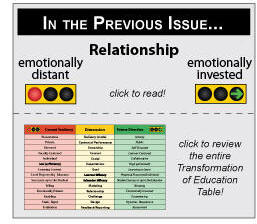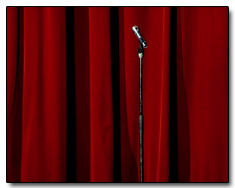|
|
The movie,
Snakes on a Plane
was popular, largely
because it combined common phobias or fears [fear of
flying (aviophobia)
+ fear of snakes (ophidiophobia)].
Given the pervasiveness of another fear, the producers
may have missed a box office bet when they didn’t name
the movie:
Public Speaking to Snakes on a Plane.
(Ref:
joyfulpublicspeaking.blogspot.com)
While the fear of public speaking (glossophobia)
is perhaps the most commonly known and experienced fear
of those that fall into a category we might call ‘fears
of public failure,’ it is by no means the only such
fear...
|

|
There is also
atychiphobia (fear of failure),
scriptophobia (fear of writing in public),
and
gelotophobia
(fear of being laughed at), among many others.
What these phobias have in common is that they constrain
one’s willingness to perform before an audience, such as
is necessary when giving a speech, performing a talent,
presenting a paper, displaying art, or even learning in
front of others. These are all activities and abilities
that are required, to varying degrees, for educational
and professional success.
We have a very real cultural tension with respect to
private versus public performance. For millennia, we have
assumed that public speaking is an important aspect of a
good education. Whether we call it the study of
rhetoric, oration, forensic debate, or the more modern
'public speaking,' we have recognized the importance of
teaching individuals to engage successfully with others
in contexts beyond one-on-one (i.e., publicly).
Simultaneous, however, is the often unspoken but still
strong injunction against sharing publicly until those
skills have been relentlessly and successfully honed.
The Ancient Greeks (who valued debate and oration)
referred to those who did not speak Greek in an educated
way as barbaroi — barbarians. The Pythagoreans
(somewhat mystical Greek mathematicians) forbade their
students to speak at all for the first few years of
their training. This injunction against speaking
publicly is still with us. As Abraham Lincoln put it,
"Better to remain silent and be thought a fool than to
speak out and remove all doubt." What this boils down to
is a cultural assumption that failure should be private
while success should be public.
In the 20th century, our culture has undergone a
tremendous shift in its consideration of private/public
with the emergence and ongoing evolution of mass media.
The majority of public performances with which our
students are familiar are those on television. And while
older viewers may prefer highly scripted or
informational shows (think The History Channel), our
students, demographically speaking, do not.
Remember The Gong Show? Candid Camera? MTV's
The Real
World? America's Funniest Home Videos?
Big Brother?
Those shows were only the beginning of our current trend
toward the most popular and often-watched kinds of
public performance. 'Reality TV' now makes up a majority
of current programming in the United States (and
Europe). In each of these reality shows, the usually
private or professional lives and performances of
individuals are made public, expressly for the
entertainment of viewers. The proliferation of web cams,
high-speed internet and sites like YouTube have made it
possible for anyone to turn a private performance (their
own or another's) into a public one. The new generation
of shows such as The Apprentice, American Idol, and
America's Got Talent have upped the ante considerably in
their focus on and handling of what might be best termed
'vocational or talent performances.' In these shows, it
is not the day-to-day activities that are made public,
but intentional performances by those who put themselves
forward in order to display their abilities in front of
an audience.
While everyone loves a Susan Boyle success story, the winner/loser risk and dynamics are made so
very melodramatic; there is rarely a middle ground
between, "You're fired!" and "America's sweetheart."
This is arguably due to the fact that these are
entertainment programs; in the world of entertainment
television, every moment must be imbued with maximum
emotional impact and/or drama. Anything else simply
won't appeal to an audience looking to be entertained.
It makes sense, then, that fears of public performance
are often so much greater than the actual risk that may
be present...that "maximum emotional impact or drama" is
subconsciously applied to even a small public
performance in front of a few classmates and instructor.
Students' thoughts about their own performance are
weighted with their perceptions about the performances
of others. To watch an otherwise private person publicly
ridiculed for a less-than-stellar performance and
be entertained by it has a profound impact on
one's willingness to follow that performance, regardless
of context or audience. There are very good reasons that
these shows are sometimes collectively referred to as
'Humiliation TV.' And remember, because our base
cultural assumption is that failure should be private,
there is a forbidden and voyeuristic thrill in watching
failure happen publicly. We are culturally conditioned
to find it shamefully compelling.
Additionally, there is the perceived pressure to be
stellar
—
to be a star performer, worthy of an
unrealistic level of praise and acclaim. Against what
scale is that performance measured? Again, our students
have a largely unrealistic and unconscious frame of
reference for what constitutes a strong performance.
Instead of useful and measurable criteria such as,
Have
I communicated my points to my audience in such a way
that they understand what I've said?, the gut-level
concern is, Will people laugh at me the way I laughed
at _____? Will they say the same cruel things that some
of the judges or Donald Trump or the anonymous comments
on the YouTube site said? Our deepest cultural roots
tell us that we should remain silent and alone,
practicing our skills in front of a mirror until our
performance has been perfected.
Why does this matter, when we're talking about education
and the transformation of education? Because this is the
culture that is 'normal' for a majority of our students.
If we understand that culture and its signals, we are
better able to appreciate the kind of perceptions and
assumptions we're dealing with
—
in ourselves as well
as our students
—
as we strive to help them succeed.
Helping students to differentiate between the cultural
signals they are given outside of the classroom
and the performance requirements and criteria inside
the classroom is a sincere challenge for any educator
committed to helping his or her students overcome their
fear-based unwillingness to perform in front of or with
others.
During Learning to Learn Camps (LLC), students are placed in
situations that require them to perform publicly. They
engage in team problem solving, participate in writing,
speech, and art contests, and are strongly encouraged to
be part of the LLC talent show. What emerges, time and
time again, is that student anxiety and fear is at its
peak going into Friday’s set of public performances.
What also becomes obvious is that when those
performances are over, students who were the most
fearful experience an incredible sense of empowerment
and a tremendous boost to their self confidence. They
have faced down and survived some of their worst fears.
At the very least, they have begun to master social and
affective learning skills without which their learning
and lives would be less rich and more solitary. While it
is possible to find a niche in life that doesn’t
require ever risking public failure, such a life is
necessarily cut off from a wealth of opportunities for
engagement and fulfillment. It can also be a life where
growth is constrained, a priori.
 Given
the pervasive nature of these ‘fears of public failure’
and the very high educational and professional price
that must be paid by those who are unwilling to face and
overcome them, the question is:
What are we, as educators, willing to do in our
classrooms to give students the opportunity to move from
‘unwilling to risk public failure’ to ‘willing to speak,
write, perform, and share with and in front of others?’
Do we give students enough opportunities to learn
through experimentation and practice? To become, if not
absolutely comfortable with something like sharing an
oral report, at least able to accommodate, manage,
and cope successfully with such tasks? Given
the pervasive nature of these ‘fears of public failure’
and the very high educational and professional price
that must be paid by those who are unwilling to face and
overcome them, the question is:
What are we, as educators, willing to do in our
classrooms to give students the opportunity to move from
‘unwilling to risk public failure’ to ‘willing to speak,
write, perform, and share with and in front of others?’
Do we give students enough opportunities to learn
through experimentation and practice? To become, if not
absolutely comfortable with something like sharing an
oral report, at least able to accommodate, manage,
and cope successfully with such tasks?
|


